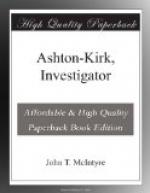Ashton-Kirk thanked the man, and with Pendleton walked through the gate. As they were descending the stairs to the street, Pendleton said:
“And now he wears a silk hat, does he? But you have not made sure of the man. You forgot to inquire if Mr. Locke favored the German dramatists.”
For a moment Ashton-Kirk looked puzzled, then he burst into a laugh.
“Ah,” said he, “you remember that.”
“Of course I remember it. How can I forget it? You go prancing about so like a conjurer that there’s not a moment that I don’t expect something. If you finish by dragging the murderer from your sleeve, I’ll not be at all astonished. Your methods lead me to expect some such a finale.”
“To explain each step as I take it,” said the investigator, “would be much more difficult than the work itself. However the time has now arrived for me to enlighten you somewhat upon this point, at least. I am quite convinced that this man Locke played a leading part in the murder of Hume. He is in a manner definitely placed, and I can speak of him without fracturing any of my prejudices.”
They got into the car, and Ashton-Kirk continued to the chauffeur:
“Christie Place.” Then to Pendleton, he added as the machine started, “I want to make some inquiries at the house where Spatola lived; and in order to make the matter clearer, we’ll just drop in at 478.”
As they proceeded along at a bounding pace, the investigator related to Pendleton what had passed between Edyth Vale and himself a few hours before. Pendleton drew a great breath of relief.
“Of course I knew that her part in the matter was something like that,” he said, “but I’m glad to hear it, just the same.” He looked at his friend for a moment and then continued: “But how did you know that Edyth heard a door close immediately after the pistol shot?”
They had just drawn up in front of Hume’s, and as Ashton-Kirk got out, he said:
“If you had only used your eyes as we were going over the place,” said he, “you’d have no occasion to ask that question.”
There was a different policeman at the door; but fortunately he knew the investigator and they were allowed to enter at once. When about half way up the stairs, Ashton-Kirk said:
“This, I think, is about the place where Miss Vale stopped when she saw the light-rays moving across the ceiling and wall of the hall. You get the first glimpse of those from this point. Remain here a moment and I’ll try and reproduce what she heard—with the exception of the cry.”
Pendleton obediently paused upon the stairs; Ashton-Kirk went on up and disappeared. In a few moments there came a sharp, ringing report, and Pendleton, dashing up the stairs, saw his friend standing holding open the showroom door—the one with Hume’s name painted upon it.
“It’s the bell,” said Ashton-Kirk, pointing to the gong at the top of the door frame. “When I examined it this morning I saw that it was screwed up too tight, and knew that it would make a sound much like a pistol shot to ears not accustomed to it.”




